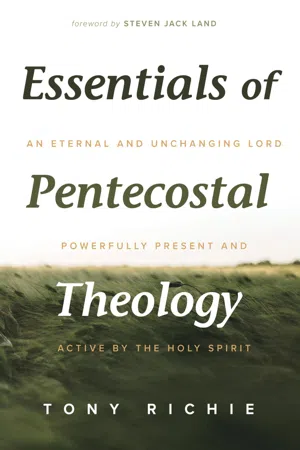![]()
Part One
Various Accents and Conflicts
![]()
1
Representative Perspectives
One can compare Pentecostal theology to the phenomenon of pronunciation in which the same language exhibits different accents. Out of many possible candidates, as it were, I have selected a few particularly significant representatives of nuanced perspectives from across the Pentecostal tradition. These include, among others who could (and should) well be named, Walter Hollenweger, French Arrington, Hollis Gause, Steve Land, Frank Macchia, Estrelda Alexander, Leonard Lovett, Cheryl Bridges Johns, Lisa Stephenson, Samuel Solivan, Eldin Villafañe, Cecil M. Robeck, Amos Yong, and Veli-Matti Kärkkäinen. Taken together, the range of their interests and approaches reflects important theological trends in the movement along with a bit of assessment and interaction on my part. Please note that I attempt to present the thought of each representative in the best possible light from their perspective. I ask readers not to assume that I agree uncritically with everything each espouses. For that matter, I do not assume that they would agree uncritically with everything I espouse or with each other. However, I certainly consider these thinkers to represent some of the best and most productive Pentecostal theology being done today.
Before proceeding, please bear in mind two realistic features of the development of contemporary Pentecostal theology. First, doing Pentecostal theology as a specific, sustained discipline, is a relatively new endeavor. For the most part, early Pentecostals were content to draw on their understanding of the Scriptures in the context of their formative traditions in light of their experience of the Holy Spirit without professional, academic theological support or direction. Second, recent Pentecostal theology has made incredible strides in an amazingly short time. The surging growth of global Pentecostalism has generated a widespread interest, extending even beyond the movement, which, coupled with the increasing affluence and influence of at least large sectors of the movement itself, has contributed to a proliferation of scholarship, in almost all fields of religious inquiry, which together have made the last several decades a period of unparalleled theological development and maturation.
Walter Hollenweger: Pentecostal Theology as Affective Orality
A Swiss historian and theologian from a Pentecostal background but with Reformed commitments, Walter Hollenweger stressed the orality of Pentecostal worship and thought as processed and expressed primarily in songs, testimonies, preaching, worship, and prayer. In this view Pentecostal theology is not so much discursive as it is affective and intuitive. Early Pentecostal thought certainly did not present itself through analytical, logical argumentation. Rather, it embraced the potential epistemological richness of attitudes, dispositions, emotions, immediate apprehension or insight—in other words, the ability to attain knowledge apart from evident rational thought. In this regard Pentecostal theology is an art rather than a science. Thus, Pentecostalism represents a dramatic (pun intended) alternative to how much of Christian theology is done.
Admittedly, overemphasis on this affective-emotional-intuitive dimension can become anti-intellectual and anti-educational. It can degenerate into fanaticism. Most negative stereotypes of Pentecostals are probably traceable to unpleasant encounters with some form of this unfortunate phenomenon. In actual practice Pentecostal appreciation for the supra-rational or non-rational (not irrational) usually facilitates a more holistic life of faith offering a much-needed corrective to reductionist extremes of post-Enlightenment rationalism and modernity’s disenchantment of ontological reality. I am reminded of two sides of C. S. Lewis. An ever-popular apologist and theologian, Lewis complemented brilliant intellectual, cognitively-oriented works such as Mere Christianity and The Abolition of Man with sublime intuitive, en-spiritedly imaginative works such as The Chronicles of Narnia and The Space Trilogy. For him theology was not either/or when it comes to analytical logic and spiritual insight; it was both/and.
An abundance of reputable Pentecostal scholars and theologians over the last several decades indicate that Pentecostals are coming to terms with the life of the mind. Along with other followers of Jesus, Pentecostals love God not only with their heart and soul but with their mind as well (Matt 22:37). And yet Pentecostal theologians must not forget the rare and precious jewel of spiritual insight and revelatory understanding as an intrinsic and essential element of knowing the things of God (1 Cor 2:10–16). The great American theologian and philosopher Jonathan Edwards well said, “holy affections not only necessarily belong to true religion, but are a very great part of such religion.” We do well to hear him further: “As there is no true religion where there is nothing else but affection, so there is no true religion where there is no religious affection.” Or as Welch well observes, although education is becoming increasingly important among Pentecostal clergy, spiritual anointing and charisma are still essential. Doing Pentecostal theology should be both an art and a science.
French Arrington: Pentecostal Theology with an Evangelical Identity
French Arrington presents a Classical Pentecostal theology similar in many ways to that of typical Evangelical theologies—but with distinctive and pronounced pneumatological and charismatic emphases. Thinking on God, Christ, the Holy Spirit, the church and...
